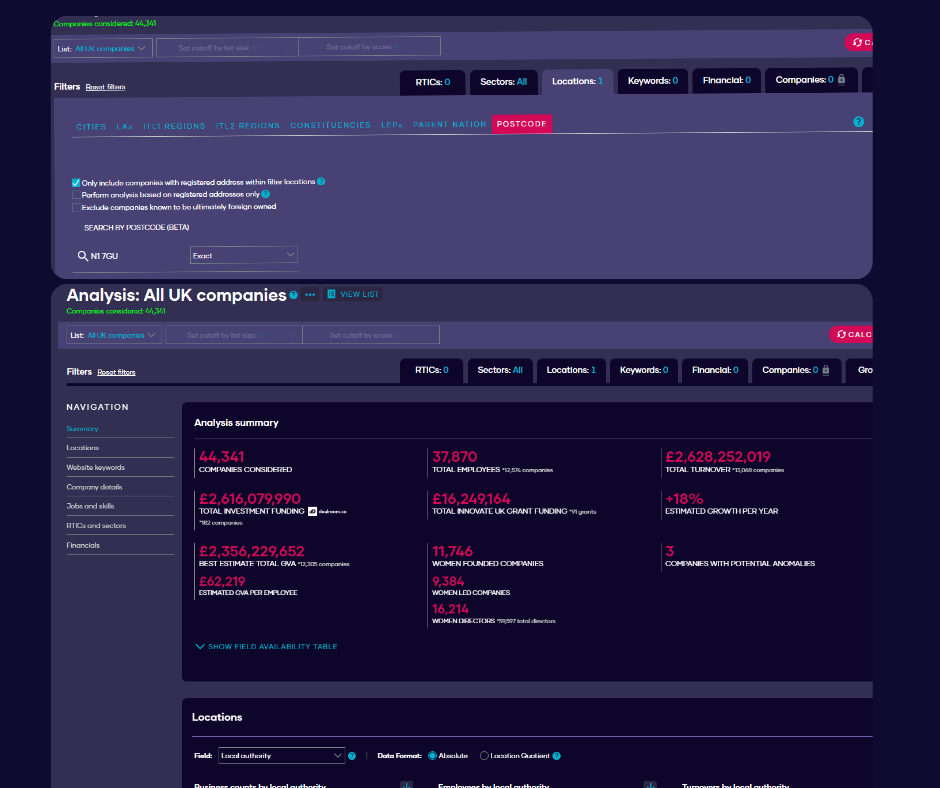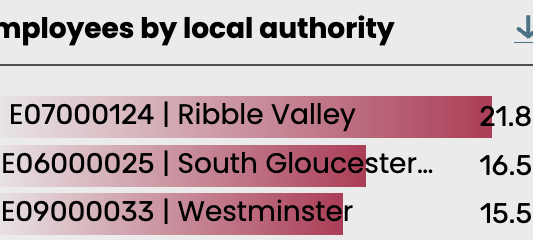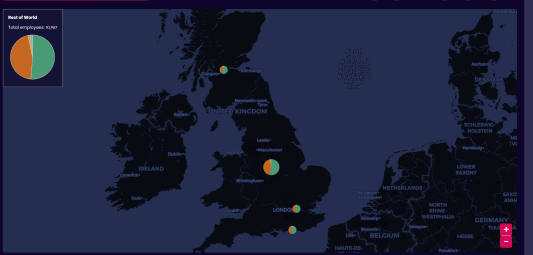Intrigued after overhearing some loopholes in Companies House regulations and eager to test our new platform feature for filtering companies by postcode, our Data Analyst Arslaan decided to dig deeper.
He discovered certain postcodes with unusually high company registration rates, and one postcode stood out: N1 7GU. Let’s investigate!
What’s so special about N1 7GU?
The postcode N1 7GU has garnered attention for an astonishing fact: it hosts 43,384 active registered companies. More intriguing is that since March 4, 2024, about 956 companies have been added to this tally and new companies are being added all the time.
This consistently high number of registrations has always been a feature of this postcode, irrespective of significant changes in UK company law, which aim to enhance transparency and reduce fraud.

Our platform now allows users to track company and sector performance at a postcode level.
Types of Fraud
Fraudsters have exploited the lack of address verification by Companies House to register companies at incorrect addresses. This fraudulent activity includes:
Credit Fraud: Using the registered company to apply fraudulently for credit.
Consumer Deception: Tricking individuals into believing a company is legitimate to defraud them of money.
Financial Crime: Setting up companies to launder money or obtain loans and overdrafts fraudulently.
These fraudulent practices undermine trust in the Companies House register and highlight the need for stringent address verification.
In an article published by The Guardian, it was reported that,
“Of the 4.9 million companies that were registered with Companies House as of March this year, experts believe that as much as 20% of the data related to them may be false.”
New Company Law Changes
According to the Companies House blog, from March 4, 2024, several pivotal changes will be implemented:
Registered Office Requirements: Companies must have an appropriate registered office address. PO Boxes will no longer suffice.
An appropriate address is one where:
- Documents sent to the registered office are expected to reach a person authorized to act on behalf of the company.
- Any documents sent to that address can be acknowledged as received.
Registered Email Addresses: All companies must provide a registered email address.
Lawful Purpose Statements: New companies must confirm their lawful purpose during incorporation, and existing companies must do the same in their next confirmation statement.
These measures are part of the Economic Crime and Corporate Transparency Act 2023, targeting inaccurate data and enhancing the integrity of the Companies House register.
Implications for N1 7GU
The surge in registrations at N1 7GU suggests that many companies are still using shared or third-party addresses. The new rules will compel these companies to update their records, potentially reducing the number of companies registered at a single address. This will not only enhance accountability but also streamline the process for authorities to monitor and enforce compliance.
Moreover, it’s noteworthy that the Financial Conduct Authority (FCA) has flagged 1,843 companies at this postcode as providing unauthorized financial services. This raises significant concerns about the oversight and regulation of financial activities.
Many companies use shared or third-party addresses to protect their privacy and present a professional image. However, relying on a single address can lead to several issues:
Privacy Risks: Using a shared address does not fully guarantee privacy, as it is still publicly accessible.
Professional Image: While a prestigious address may impress clients, it might also mask the true scale of the business. The Data City platform shows that there are almost 3,000 companies with multiple operating addresses in the UK, highlighting a discrepancy that can affect perceptions.
Mail Handling: Shared addresses often lead to a mix of important and junk mail, necessitating additional handling and potential loss of critical correspondence.
Regulatory Compliance: With new laws, companies must ensure they meet Know Your Customer (KYC) and Anti-Money Laundering (AML) regulations, which may complicate the use of shared addresses.
Setting up a company is relatively straightforward and has recently cost as little as £50. As a result, many incorporated companies lack tangible assets, such as employees. In more complex corporate group structures, it’s even possible for large companies to have no employees.
In our entire dataset of 5.6 million companies, 2.9 million (about 50%) have no employees. However, the proportion of companies with no employees is higher than average at N1 7GU, with approximately 70% of the companies registered there having 0 employees.
Conclusion
The introduction of these new regulations marks a significant step towards greater transparency and reliability in UK corporate practices. As the changes come into full effect, it will be interesting to observe how they reshape the landscape of company registrations, particularly in high-density areas like N1 7GU.
Are you interested in discovering more data like this? Get in touch or sign up for a free trial today.


